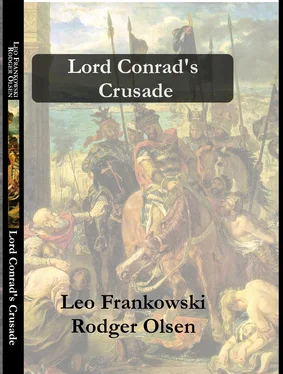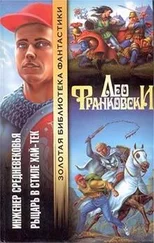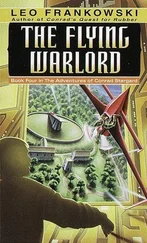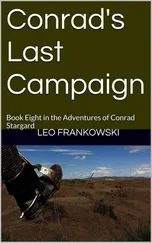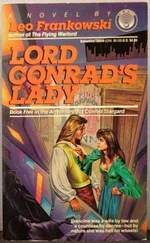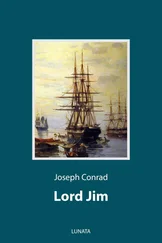Лео Франковски - Lord Conrad's Crusade
Здесь есть возможность читать онлайн «Лео Франковски - Lord Conrad's Crusade» весь текст электронной книги совершенно бесплатно (целиком полную версию без сокращений). В некоторых случаях можно слушать аудио, скачать через торрент в формате fb2 и присутствует краткое содержание. Год выпуска: 2014, Издательство: Great Authors Online, Жанр: Альтернативная история, на английском языке. Описание произведения, (предисловие) а так же отзывы посетителей доступны на портале библиотеки ЛибКат.
- Название:Lord Conrad's Crusade
- Автор:
- Издательство:Great Authors Online
- Жанр:
- Год:2014
- ISBN:нет данных
- Рейтинг книги:3 / 5. Голосов: 1
-
Избранное:Добавить в избранное
- Отзывы:
-
Ваша оценка:
- 60
- 1
- 2
- 3
- 4
- 5
Lord Conrad's Crusade: краткое содержание, описание и аннотация
Предлагаем к чтению аннотацию, описание, краткое содержание или предисловие (зависит от того, что написал сам автор книги «Lord Conrad's Crusade»). Если вы не нашли необходимую информацию о книге — напишите в комментариях, мы постараемся отыскать её.
Lord Conrad's Crusade — читать онлайн бесплатно полную книгу (весь текст) целиком
Ниже представлен текст книги, разбитый по страницам. Система сохранения места последней прочитанной страницы, позволяет с удобством читать онлайн бесплатно книгу «Lord Conrad's Crusade», без необходимости каждый раз заново искать на чём Вы остановились. Поставьте закладку, и сможете в любой момент перейти на страницу, на которой закончили чтение.
Интервал:
Закладка:
Everyone was at the front gate to wish me goodbye. I was delayed once more, kissing my wives and children, promising to always wear my weapons, shaking hands with my friends and subordinates, and waving to all the girls in the crowd.
But eventually, we were gone, with the open road ahead of us.
All of our railroad tracks had bridle trails running alongside of them, mostly for use of the mail carriers, and also to keep civilians from cluttering up our tracks.
There was also a line of telegraph poles near the track, since this was all army property, and could be easily guarded. The wires were difficult to maintain on civilian property, since the copper was sufficiently valuable to attract thieves.
After the Mongol invasion, this road had Mongol spears stuck into the ground, every two yards, for its entire length. And every spear had a Mongol’s head stuck on top of it. It was my way of telling the world not to mess with us. Now, most of the spears were gone, and only a few still had a weathered skull above them. But they’d served their purpose.
Back then, the tracks had been bolted together from lengths of cast nodular iron, and the cross ties had been of untreated wood. Now, the tracks were of a rust resistant steel welded end-to-end with inert gas arc welders, and the cross ties were of reinforced concrete. In the long run, it was cheaper, and made for a much smoother ride.
It was a lovely spring afternoon, and Silver was running for the sheer joy of it. Cynthia was enjoying herself as well, and soon she began to sing. I’d seen her mother and her dance often enough, and they were marvelous at it. Now I learned that her voice was to be treasured as well.
I could tell that Silver loved it as well. Horses like you to sing to them, and the Big People shared the trait, not that they were horses, of course. But they looked like the finest of horses, and could impersonate them when they wanted to. Many Slavic songs were written to be sung on horseback, with the rhythm of the horse’s hooves acting as the percussion section.
“You have a lovely voice! That was an old Polish folk song you were singing, wasn’t it?”
“Yes, sir.”
“Beautiful! But during this trip, I want you to just call me Conrad. I don’t want to call any more attention to myself than necessary.”
She smirked slightly, thinking perhaps that since I was well over two yards tall, was riding one of the finest of horses in the world, and was wearing a sword worth half of a kingdom, that people would have little difficulty knowing who I was.
I said, “Here’s a song in English, so Silver can enjoy the words.”
So we sang out the afternoon, all the way to Krakow.
Every five miles or so, we passed one of my snowflake forts. These were hexagonal defensive structures made of pre-cast concrete panels. Each had a company of men living in it, along with their families. Aside from one day a week spent in military training, they were mostly farmers, usually with some agricultural specialty.
The number of Big People had expanded to the point where there enough of them for almost every warrior in the army to have one. Rather than letting their numbers get out of hand, and desiring them to be strictly an army monopoly, we had asked them to slow down their breeding. They had complied, but it turned out that we had overshot our mark by a considerable margin. It would be ten years before the human population matched that of the Big People.
Many of the Big People worked in transportation and for the post office, where they did their jobs without needing a human rider or teamster. Yet they still preferred a one-on-one relationship with a single warrior and his family. Most often, they actually lived with the family, having very clean habits. All of our buildings were designed to permit a Big Person to move around in them without difficulty.
Much of the agricultural work was actually done by Big People. Certainly, they did all the weeding and the hauling. Our plows didn’t need a human being walking behind them, and our harvesting machinery was getting sophisticated.
Most snowflake forts had some light industry going on to take up the slack in the winter.
You could look at each fort as being a large apartment house, with a church, a school, stores, and a decent bar, a small version of my Pink Dragon Inns. Each had a co-generating power house, a library, a cafeteria, a post office, a hospital, wells, and a septic system. While a bit spartan by modern standards, they were luxurious by those of the Thirteenth Century.
Most of the people in the Christian Army lived in snowflake forts, and were quite proud of them. They were my attempt at combining the best parts of a small city, big enough to not be stultifying, small enough so that you knew all of your neighbors, along with the best that our current technology could offer them.
The economic structure had some of the elements of capitalism with some of the better parts of socialism. In the army, you and your family always had a secure place to live, clothes to wear, food to eat, and such medical support as was available, along with a bit of spending money.
But every company was its own profit center. They rented their land and buildings from the army, and then, after all expenses and salaries were paid, they split any surplus with the Christian Army as profits. If the people of the company wanted luxuries they had to figure out a way to be productive!
Most companies managed to do it, and some in a spectacular manner!
The snowflakes had all been cement gray when we’d first put them up, but then a company of ceramics specialists came up with a system of large, colorfully decorated tiles that fit to an external metal framework, at about the same time as a company of glass specialists had perfected a fiberglass insulation that could be placed between the tiles and the concrete.
One summer when I was a student in America, I had worked with a traveling fair, making and selling cotton candy. The same simple mechanism worked very nicely, at higher temperatures, and with different materials, to make fiberglass!
The captains of the two companies were smart enough to get together and come up with a practical system.
The resulting system insulated the building, as well as decorating it. Most of my people were really peasants, and their tastes were peasant tastes. And those living in every fort wanted to have the beautiful tiles. Since each fort was its own profit center, they had to buy them on their own money, but they could afford it, most of them anyway.
Now, each of the older forts was a dazzling riot of color, with no two of them alike. The younger ones were saving their money to catch up.
The two companies that had worked out the system had each expanded over six times. The captains and most of their men had earned promotions, and all of their companies were now rich.
We could have stopped at any of the snowflake forts along the way, but that would have been too much like a busman’s holiday. In Cracow was one of the finest inns in the world, and I owned it. We’d stop for the night at the Cracow Pink Dragon Inn.
As we went through the city gate, the guard snapped to attention as if he was one of my men, although he was actually hired by the city government. “Welcome, Lord Conrad! Shall I notify Wawel Castle that you have arrived?”
I halted Silver. “No, please don’t do that. We only have a little time here, and then we must leave in the early morning. I would just as soon the people on the hill didn’t know that I was here at all.”
“It will be as you wish, my lord.”
I wish the people who knew me better were so willing to do as I wished!
“Thank you,” I said and rode on. A tip wouldn’t have been appropriate. Really rich people didn’t do that.
Читать дальшеИнтервал:
Закладка:
Похожие книги на «Lord Conrad's Crusade»
Представляем Вашему вниманию похожие книги на «Lord Conrad's Crusade» списком для выбора. Мы отобрали схожую по названию и смыслу литературу в надежде предоставить читателям больше вариантов отыскать новые, интересные, ещё непрочитанные произведения.
Обсуждение, отзывы о книге «Lord Conrad's Crusade» и просто собственные мнения читателей. Оставьте ваши комментарии, напишите, что Вы думаете о произведении, его смысле или главных героях. Укажите что конкретно понравилось, а что нет, и почему Вы так считаете.
